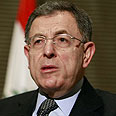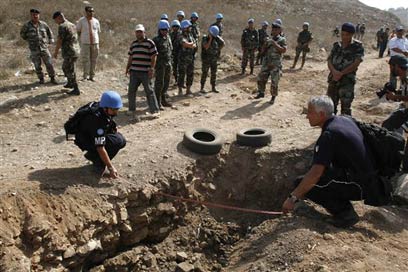
Lebanon: Israeli cables explosion violates Resolution 1701
Lebanese Prime Minister Siniora says detonation of alleged spy devices along border, drone overflights are blatant infringement of UN resolution which ended Second Lebanon War; UNIFIL launches investigation into incident
Siniora also said that drones were spotted in Lebanese airspace at the time of the detonations – another violation of the resolution.
Earlier, a Lebanese military spokesperson claimed that two cables were remotely detonated by the Israeli military. A third cable was destroyed by the Lebanese army.
"Both explosions seem to have been triggered by Israel in order to destroy devices it had planted in the sector a long time ago. Israel feared the devices would be discovered and decided to destroy them," she said.
The Lebanese army also reported firing at the drone, saying the unmanned aircraft was "in range."
Earlier still, Hezbollah claimed that it was the one to uncovered the cables, saying Israel used them to tap its communications near the town of Houla in southern Lebanon.

Scene of one of the explosions (Photo: AP)
Hezbollah's commander in south Lebanon, Nabil Kaouk said that "Israel's repeated threats and violations prove it is a danger to Lebanon."
Speaking at the town of Aita al-Shaab, he added: "The 6,000 violations of international decision and Lebanon's sovereignty by Israel have yet to prompt the UN Security Council to call even one meeting. Lebanon's term in the Security Council will allow it to thwart Israel's violations before they become a matter of fact."
UNIFIL: They do look like espionage devices
Meanwhile, the UNIFIL peacekeeping force began investigating the incident, saying initial findings indicated the detonations were triggered by underground sensor devices, apparently planted during the Second Lebanon War in 2006.
"These do look like some sort of espionage device," Michael Williams, the UN special coordinator for Lebanon, said.
"Preliminary indications are that these explosions were caused by explosive charges contained in unattended underground sensors which were placed in this area by the Israel Defense Forces apparently during the 2006 war," UNIFIL said in a statement.
A Lebanese security official added that the devices appeared to have been detonated by remote control from Israel after their discovery by Lebanese security forces.
If confirmed, the devices would represent violations of Security Council resolution 1701 which halted the 34-day war.
Israel did not respond specifically to Lebanon's assertion, but an Israeli military statement said Sunday's incident proved Hezbollah's military presence in south Lebanon, especially in rural Shiite areas along the border with Israel.
UNIFIL said it had protested to the Israeli military about overflights by drones while the Lebanese army and the peacekeepers were investigating on the ground. Lebanese army troops opened fire on the drones with machine gun and small arms fire, the UNIFIL statement said.
Williams said the use of drones was an obvious violation of Lebanese sovereignty and resolution 1701 "and not particularly helpful at a time of obvious tension in the south".
Reuters contributed to this report










